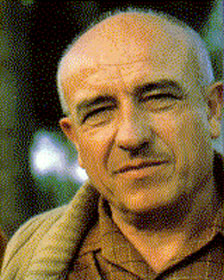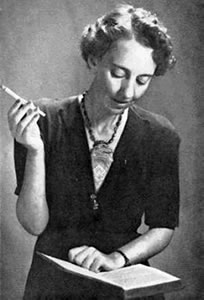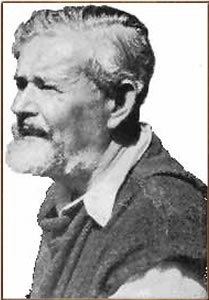De Zuid-Afrikaanse schrijver André Brink werd geboren op 29 mei 1935 in Vrede. Zie ook mijn blog van 29 mei 2007 en ook mijn blog van 29 mei 2008.
Uit: Surprise Visit
“There is no one at the reception desk to welcome him. This suits him perfectly. One can only assess the standard of care-giving in an old-age home if they aren’t alerted to your coming. Even more important is that he wants to surprise her. He has something to tell her, something he has spent a lifetime looking for and which he must share with her. It is now almost two years since his last visit. One doesn’t feel good about these long intervals, but what else can one do? Princeton is not exactly round the corner from Cape Town. And, anyway, his sister Jolene is living right here in the city, close by, in Claremont, and since her husband’s death she hasn’t had much to occupy her. In any case, it isn’t as if Mum is really aware of what is going on around her. For at least three years now, since the last stroke, she has just been lying here. Waiting. For ‐ well. Still has some lucid moments, says Jolene, but fewer and further between. Hardly ever recognises anybody.
He goes through the reception area to the corridor, where he quickly makes sure that nobody is approaching from either end. Then, following Jolene’s instructions, he turns right. The last time he visited her was with his family, just before they left the country. Her room was to the left then, three doors down. But the home likes to shift them around. A change of scenery? Hardly. His own feeling is that the old people ‐ Mum, undoubtedly ‐ find these shifts deeply distressing. Every time it becomes a radical displacement. As bad as those moves in his youth, from one town to the next, as the bank authorities in their wisdom transferred them across the map of the country. Every time a new school, new friends, new teachers, new everything.”
André Brink (Vrede, 29 mei 1935)
De Engelse letterkundige, schrijver en journalist Gilbert Keith Chesterton werd geboren in Londen op 29 mei 1874. Zie ook mijn blog van 29 mei 2007 en ook mijn blog van 29 mei 2008.
Uit: Father Brown. The Essential Tales
“Between the silver ribbon of morning and the green glittering ribbon of sea, the boat touched Harwich and let loose a swarm of folk like flies, among whom the man we must follow was by no means conspicuous—nor wished to be. There was nothing notable about him, except a slight contrast between the holiday gaiety of his clothes and the official gravity of his face. His clothes included a slight, pale grey jacket, a white waistcoat, and a silver straw hat with a grey-blue ribbon. His lean face was dark by contrast, and ended in a curt black beard that looked Spanish and suggested an Elizabethan ruff. He was smoking a cigarette with the seriousness of an idler. There was nothing about him to indicate the fact that the grey jacket covered a loaded revolver, that the white waistcoat covered a police card, or that the straw hat covered one of the most powerful intellects in Europe. For this was Valentin himself, the head of the Paris police and the most famous investiga
tor of the world; and he was coming from Brussels to London to make the greatest arrest of the century.
Flambeau was in England. The police of three countries had tracked the great criminal at last from Ghent to Brussels, from Brussels to the Hook of Holland; and it was conjectured that he would take some advantage of the unfamiliarity and confusion of the Eucharistic Congress, then taking place in London. Probably he would travel as some minor clerk or secretary connected with it; but, of course, Valentin could not be certain; nobody could be certain about Flambeau.
It is many years now since this colossus of crime suddenly ceased, keeping the world in a turmoil; and when he ceased, as they said after the death of Roland, there was a great quiet upon the earth. But in his best days (I mean, of course, his worst) Flambeau was a figure as statuesque and international as the Kaiser. Almost every morning the daily paper announced that he had escaped the consequences of one extraordinary crime by committing another. He was a Gascon of gigantic stature and bodily daring; and the wildest tales were told of his outbursts of athletic humour; how he turned the juge d’instruction upside down and stood him on his head, “to clear his mind”; how he ran down the Rue de Rivoli with a policeman under each arm.“
G. K. Chesterton (29 mei 1874 – 14 juli 1936)
De Hebreeuwse dichteres, schrijfster en letterkundige Leah Goldberg werd geboren in Königsberg (Pruisen) op 29 mei 1911. Zie ook mijn blog van 29 mei 2007 en ook mijn blog van 29 mei 2008.
THE TREE SINGS TO THE RIVER
He who carried my golden autumn,
Swept away my blood with the leaf fall,
He who shall see my spring when it returns
To him with the turning of the year.
My brother, the river, who is forever lost,
New each day and different and one,
My brother the stream between his two shores
Who flows as I do between spring and fall.
For I am the bud and I am the fruit,
I am my future and I am my past,
I am the solitary tree trunk,
And you — you are my time and my song.
THE GIRL SINGS TO THE RIVER
To where will the stream carry my small face?
Why is he tearing my eyes?
My home is far away in a pine grove,
Sad is the swishing of my pines.
The river seduced me with a joyous song
Caroled and called me by my name,
I went to him, following the sound,
I abandoned my m
other’s house.
I am her only child, tender in years
And a cruel river is before me —
To where is he carrying my small face?
Why is he tearing my eyes?
Leah Goldberg (29 mei 1911 – 15 januari 1970)
De Oostenrijkse dichter, schrijver en uitgever Till Mairhofer werd geboren op 29 mei 1958 in Steyr. Zie ook mijn blog van 29 mei 2008
Wohin
w o h i n
sich die wortlosen wenden
weiß auch die nacht nicht
die sie verliert
denn diese nacht
reicht für ihr dunkel nicht aus
auch ist kein morgen
welcher sie ruft
fliehend erhellt
von der gegenwart schein
stürzen sie
durch die zeit
Till Mairhofer (Steyr, 29 mei 1958)
De Oostenrijkse schrijver en theatercriticus Hans Weigel werd geboren op 29 mei 1908 in Wenen. De jaren tussen 1938 en 1945 bracht hij door in ballingschap in Zwitserland. Samen met Friedrich Torberg was hij jarenlang verantwoordelijk voor een boycot van Bertold Brecht in de Oostenrijkse theaters omdat hij diens communistische wereldbeschouwing afwees. Tussen 1951 en 1954 gaf hij een serie bloemlezingen uit, waarin hij jonge schrijvers als Ingeborg Bachmann en Gerhard Fritsch introduceerde.
Uit: Niemandsland
“Österreich nimmt den Untergang Österreichs nicht zur Kenntnis. Man hört hier auch schon das verhängnisvolle Wort vom “kleineren Übel”, das in Deutschland geprägt worden ist, so lange, bis die Betonung von dem “kleiner” unerheblich immer mehr auf “Übel” gewechselt hatte, so lange, bis das Übel unversehens immer grösser und schliesslich das ganz grosse geworden war. Peter versucht vergeblich darzutun, dass man jedes Übel bekämpfen müsse, ob es nun kleiner oder grösser sei.
Peter kann solche Gespräche nicht mehr hören. Es ist gespenstisch, höllisch, dass man hier das selbe erleben muss wie draussen, einen Staat auf dem selben Weg in den Untergang sehen und ein Volk die selben selbstbetrügerischen Phrasen dazu sagen hören muss, ohne dass man helfen kann, ja ohne dass der dokumentarische Hinweis dieser Gleichartigkeit auch nur zur Kenntnis genommen wird.
Peter fühlt sich erschöpft und völlig leer. Alles, was er, seit er denken kann, erlebt hat, alle Enttäuschung, alle Fragwürdigkeit seiner Existenz und der letzten Tage zumal, alles steigt auf, wächst unerträglich in ihm an und höhlt ihn aus. Kein Erlebnis kann ihn aus dieser Hoffnungslosigkeit reissen, was immer geschieht, wird sie nur bestätigen, falls es unerfreulich, wird sie doppelt grausam machen, wenn es erfreulich ist.”
Hans Weigel (29 mei 1908 – 12 augustus 1991)
De Engelse schrijver Terence Hanbury (Tim) White werd geboren op 29 mei 1906 in Bombay (Mombai). Hij studeerde in Cheltenham en Cambridge. Hij is bekend geworden met zijn verhalenepos rond Koning Arthur, The Once and Future King, voor het eerst gepubliceerd in 1958. Het is in het Nederlands vertaald door Max Schuchart onder de titel “Arthur, Koning voor eens en altijd”. Een ander boek van White is “The Goshawk” (1951), een roman over het temmen en trainen van een havik voor de valkenjacht, gebaseerd op echte gebeurtenissen.
Uit: The Once and Future King
“When God had manufactured all the eggs out of which the fishes and the serpents and the birds and the mammals and even the duck-billed platypus would eventually emerge, He called the embryos before him, and saw that they were good.
Perhaps I ought to explain,’ added the badger, lowering his papers nervously and looking at Wart over the top of them, ’that all embryos look very much the same. They are what you are before you are born – and, whether you are going to be a tadpole or a peacock or a cameleopard or a man, when you are an embryo you just look like a peculiarly repulsive and helpless human being. I continue as follows:
The embryos stood in front of God, with their feeble hands clasped politely over their stomachs and their heavy heads hanging down respectfully, and God addressed them.”
T. H. White (29 mei 1906 – 17 januari 1964)
De Franse schrijver Bernard Charles Henri Clavel werd geboren op 29 mei 1923 in Lons-le-Saunier. Clavel is een autodidact die diverse baantjes had totdat hij in de jaren vijftig als journalist begon te werken. Na de oorlog werkte hij voor een verzekering en pas in 1964 kon hij zich geheel wijden aan het schrijven. Zijn eerste roman L’Ouvrier de la nuit verscheen in 1956.
Uit: Les roses de Verdun
« Ce soir-là, j’ai senti qu’il serait plus convenable de ma part de laisser mes patrons en famille. Vers sept heures, j’ai demandé si je pouvais disposer.
– Mais il faut que vous mangiez, Laubier, a tonné Monsieur. Vous n’allez pas me laisser tomber. C’est indigne d’un poilu!
– Je n’ai pas faim, Monsieur, et j’aimerais aller au cinéma. J’ai vu qu’on donne Les gueux au paradis. J’aime bien Fernandel et Raimu.
Monsieur m’a lancé:
– C’est parfait, mon petit. Mais n’allez pas courir la gueuse. Ça ne mène pas au paradis et je veux vous avoir en forme demain matin.
Je crois qu’ils ont compris que je me retirais par discrétion et apprécié mon attitude.
Il ne pleuvait plus. Il faisait beaucoup plus froid. Une bise aigre prenait la rue en enfilade. Le cinéma n’était pas loin, mais j’étais très en avance. Je suis entré dans un café où j’ai bu un canon de rouge en mangeant une curieuse petite tarte salée achetée dans la charcuterie voisine. Il n’y avait pas grand monde dans ce bistro. Seulement des habitués. Ils parlaient au patron, gros homme rouge qui boitait bas. Quatre vieux jouaient aux cartes en se chamaillant. Quand le patron m’a servi, il a regardé ma boutonnière.
– Alors, on vient revoir les anciens?
Il m’a demandé dans quel régiment j’avais servi, j’ai répondu, et deux hommes sont entrés, qu’il a rejoints. J’étais soulagé qu’il me laisse tranquille. Il ne pouvait pas mieux dire quand il parlait de revoir les anciens. Depuis que j’avais quitté l’hôtel, ils étaient tous après moi, mes copains. Surtout les morts. C’était curieux, car ils ne faisaient pratiquement rien. Ils se contentaient d’être des visages sous des képis ou des casques. Et sous pas mal de boue brune aussi. »

Bernard Clavel (Lons-le-Saunier, 29 mei 1923)
De Franse schrijfster Anne Marie Louise d’Orléans, hertogin van Montpensier, werd geboren op 29 mei 1627 in Parijs. Zie ook mijn blog van 29 mei 2007.
Uit: MÉMOIRES DE MLLE DE MONTPENSIER
“Le commencement du malheur de ma maison arriva peu après ma naissance (29 mai 1627), puisqu’elle fut suivie de la mort de ma mère 1 : ce qui a bien diminué de la bonne fortune que le rang que je tiens me devoit faire attendre. Les grands biens que ma mère a laissés à sa mort, et dont je suis seule héritière, pouvoient bien, dans l’opinion de la plupart du monde, me consoler de l’avoir perdue. Pour moi, qui conçois aujourd’hui de quel avantage m’auroient été ses soins dans mon éducation, et son crédit, joint à sa tendresse, dans mon établissement, je ne saurois assez regretter sa perte.
Bientôt après qu’elle fut morte, on fit ma maison, et l’on me donna un équipage bien plus grand que n’en a jamais eu aucune fille de France, même pas une de mes tantes, les reines d’Espagne2 et d’Angleterre3 et la duchesse de Savoie4, avant que d’être mariées. La reine, ma grand’mère5, me donna pour gouvernant madame la marquise de Saint-Georges6, de qui le mari étoit de la maison de Clermont d’Amboise ; elle étoit fille de madame la marquise de Montglat, qui avoit été gouvernant du feu roi, de Monsieur, de feu mon oncle7 le duc d’Orléans, et de toutes mes tantes ; et c’étoit une personne de beaucoup de vertu, d’esprit et de mérite, qui connoissoit parfaitement bien la cour. »
Anne d’Orléans de Montpensier (29 mei 1627 – 5 april 1693)
Onafhankelijk van geboortedata:
De Vlaamse dichter Reinout Verbeke werd geboren in 1981. Hij won al heel jong de Anton Van Wilderodeprijs en daarna nog diverse prijzen. Gedichten van hem werden opgenomen in tijdschriften als Dietsche Warande en Belfort, Gierik, De Brakke Hond, KFV-Mededelingen, Ambrozijn en in de bloemlezing ” Op het oog. 21 dichters voor de 21e eeuw “. Hij is de organisator van het poëziefestival Literaire Living en treedt sinds 2007 onder de naam Reinout met Nevenwerking op met muziek en poëzie. Professioneel werkt hij bij het maandblad EOS, waarvan hij enkele jaren eindredacteur is geweest en nu ‘ Nieuwscoördinator on line’
Axon
ik heb een zwemster in mijn lijf
ze peddelt traag mijn lichaam
door
tikt randen die geen randen zi
jn
maar volgehouden
randgedachten
bloedgeil word ik daarvan
ze is mijn onderhuidse gast
ze is een zenuw op de tast
een axon zonder plan
zwemmen is niet het water
mennen
maar altijd verliezen van
ik heb een zwemster in mijn lijf
gevoeld
ze zwom de gedachte los
aan een rand, spoelde aan in een
spier
Reinout Verbeke (1981)




















